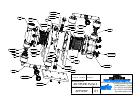
PFD4/PFS4 – OPERATING INSTRUCTIONS
INDEX DATE N°
03 22/04/02 DC04020US
2/8
Thank you for choosing our SAINT-GOBAIN PERFORMANCE PLASTICS ASTI AstiPure™ model
PFD4 pump, series 3 (or PFS4: slurry applications).
I – General
I.1 – Introduction
The model PFD/PFS is a pneumatically operated TEFLON
®
pump. There are no internal or external
metal parts.
The pump is designed for handling corrosive, inflammable, and sterile fluids. It meets the
requirements of the semiconductor, pharmaceutical and chemical industries.
I.2 – Materials
All wetted parts are manufactured in TEFLON
®
PFA HP and PTFE.
Other parts are made of high-tech plastics such as PVDF, PEEK etc.
There are no metal parts.
I.3 – Operation
The pump is pneumatically operated; two bellows joined by a central shaft reciprocate horizontally.
The suction and delivery strokes alternate from one side of the pump to the other.
The pump is self-priming and has four balls, which seat on lip seals (check valves).
The pumping frequency of a bellows pump is much slower than an equivalent diaphragm pump and
results in an extended life for the bellows.
Pulsation dampers with wetted parts in TEFLON
®
PFA and PTFE are available as an option. This
dampens the pulse by approximately 65 to 80%.
The pulsation damper for the PFD4/PFS4 pump is AMC4/AMS4.
I.4 – Pump data
Flow rate 25 GPM (6000 L/h)
Discharge pressure 58 PSI (4 bar)
Suction head 13 feet water column (4 m)
Max. air consumption 23.5 SCFM (40 m³/h) TPN.
Fluid connection TEFLON
®
tubing ∅ 7/8”x1” (22x25 mm) or flange PN 10 DN 25.
Air connection. 1/2" gas
Tubing ∅ 3/8”x1/2” (10x13 mm) maximum
10 feet (3 m) < length < 16 feet (5 m)
Leak detector connection M8
Weight 32 lbs (15 kg)
Our range also includes three other models with their optional pulsation dampers:
PFD1/PFS1 Flow rate 2.5 GPM (10 L/min) AMC1/AMS1
PFD2/PFS2 Flow rate 5 GPM (20 L/min)) AMC2/AMS2
PFD3/PFS3 Flow rate 12.5 GPM (50 L/min) AMC3/AMS3
II – Quick checklist
II.1 – Shipment
Pumps are cleaned and assembled in our clean room, then double sealed in plastic bags to ensure
they are not contaminated in transit. They are then packed in cartons with Polyethylene protection.


















